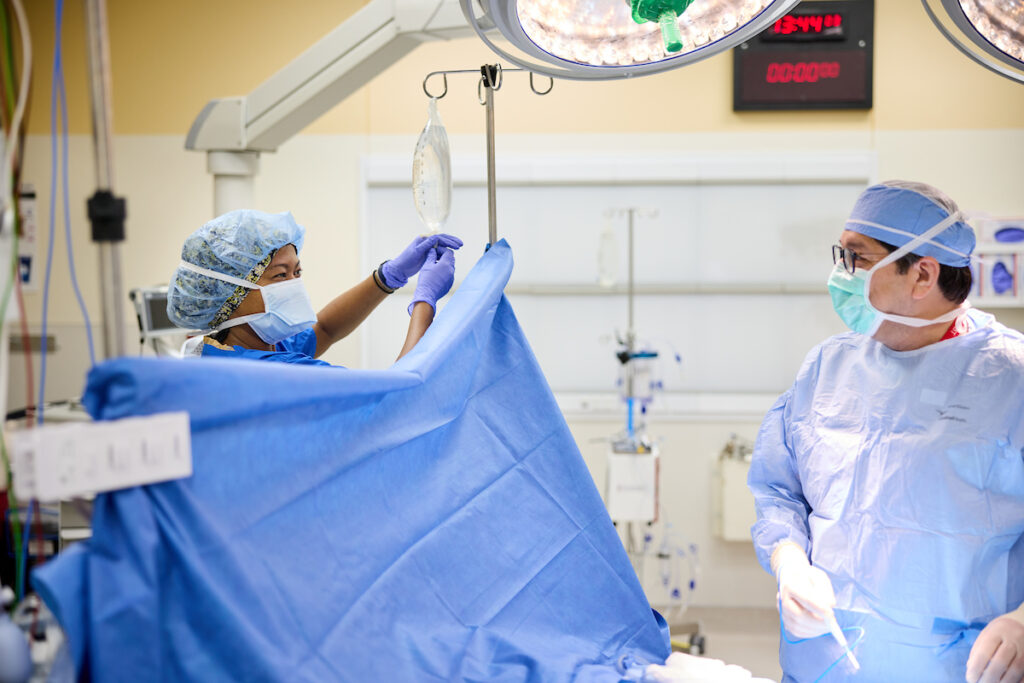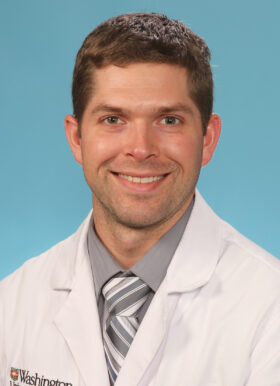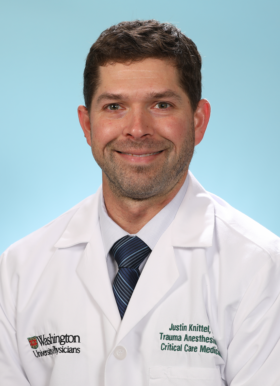The fellowship in Trauma Anesthesiology at Washington University in St. Louis is one of only a few of its kind in the United States. The fellowship is a 12-month program and consists of OR rotations, ICU rotations, and elective rotations, as well as non-clinical time and time set aside for self-study, meetings/conferences, and educational activities. Seven months are devoted to OR anesthesia on the Trauma Anesthesia Service, focusing on preoperative clinical care, supervision of residents in anesthesiology, and administrative/triage management of the ORs. During this time, fellows will focus on caring for patients with acute traumatic injuries to the head, chest, abdomen/pelvis, spine, and extremities, urgent/emergent surgeries, as well as patients under Acute/Critical Care Surgery, Orthopedic Trauma, Vascular, ENT, and Neurosurgery. In addition, two months are spent as a Critical Care Fellow, managing critically ill patients in both the Neuro ICU and Surgical ICU. Electives compose the rest of the year and allow the fellow to learn a specialized skill or knowledge base from the trauma perspective. These rotations include Blood Bank/Transfusion Medicine, Critical Care Ultrasound/TEE, ER Radiology, Regional Anesthesiology, and Prehospital Management. Furthermore, fellows can choose to participate in global health projects offered by the Department of Anesthesiology if available. Fellows must obtain the ATLS certification at both the provider and instructor levels and are eligible to obtain basic echocardiography certification. Fellows also participate in departmental grand rounds, trauma service meetings, and conferences.
The fellow’s schedule is flexible, on average consisting of 16 shifts/month, which are served primarily alongside the Trauma Anesthesia attending. This time is split between supervision of CRNAs and residents or personally providing anesthesia for Acute Care Surgery, Orthopedic trauma, and neurosurgical patients while also being available for any urgent/emergent trauma cases that may occur throughout the day. In addition to clinical responsibilities, the trauma fellow assists with the administrative duties of OR staff management and triage, deciding what cases to start and hold based on OR workload and demand.

Fellows play an important role in the care of incoming trauma patients at the Emergency Department during their shift. They collaborate closely with a team comprising of Trauma Anesthesia attendings and colleagues from Trauma Surgery. During the initial assessment, trainees actively engage with Emergency Medicine and Surgery staff to contribute to the comprehensive evaluation and care of acute trauma patients. This involvement encompasses tasks such as airway management, line placement, resuscitation, imaging, and facilitating the patient’s transportation to the operating room.
Fellows actively engage in various educational conferences and activities related to Trauma Anesthesiology and the Department of Anesthesiology throughout the year. They assume an integral role in teaching residents during their Trauma Anesthesia rotations, which includes facilitating journal clubs, case conferences, and clinical teaching sessions. These educational activities take place in our simulation center and ORs. To support their professional development, fellows have one non-clinical day each week dedicated to work on projects and education. Additionally, they receive five meeting days to be utilized at their discretion throughout the year, allowing them to attend local, regional, national, or international conferences related to trauma care. Furthermore, fellows enjoy the benefit of 15 days of annual vacation time and receive a $1,500 discretionary fund from the department.

Fellowship Director
Dear applicant,
Thank you for your interest in the Trauma Anesthesiology Fellowship Program here at Washington University School of Medicine and Barnes-Jewish Hospital. Our mission is to provide state-of-the-art clinical care and resuscitation to the acute trauma patient, while also providing an academic environment where fellows and trainees can develop to their full potential and master a wide range of skills. Trauma Anesthesia is a fast-paced and intense field of medicine, one that is incredibly challenging but also extremely rewarding as we work to provide life to patients on the brink of death.
Washington University in St. Louis and Barnes-Jewish Hospital provide opportunities that are unmatched. Fellows here work with experts in trauma from Anesthesia, Surgery, Emergency Medicine, and Critical Care, in a truly multidisciplinary environment. Our robust academic training program here at the School of Medicine provides unlimited opportunities for education development and research. In addition, we are very fortunate to have a wonderful relationship with the United States military, working with the United States Air Force and the Center for the Sustainment of Trauma and Readiness Skills (C-STARS) program, which designate military clinicians into our civilian environment, as well as provide training for SRNAs in the United States Army.
Our Trauma faculty are dedicated to providing outstanding clinical care and teaching, and we will work to provide an environment that challenges but also allows you to excel and develop your skills. I have no doubt that we can help you reach your potential, as an anesthesiologist and clinician, and that your time here in St. Louis will serve you well in any of your future endeavors.
Should you have any questions regarding our fellowship program, please contact either me or our Fellowship Coordinator, Jennifer Mahan at mahanj@wustl.edu.
Best,
Justin
Justin Knittel, MD
Interim Division Chief, Trauma Anesthesiology
Associate Professor, Anesthesiology
Fellowship Director, Trauma Anesthesiology
Resident Education Director, Surgical ICU
knittelj@wustl.edu

[Left to right] Dr. Amrita Aranake-Chrisinger, Dr. Marcelino E. Murillo-Deluquez, Dr. Mahdi El Jallad, Dr. Mary Hanna
Fellowship Director

Justin Knittel, MD
Interim Division Chief of Trauma Anesthesiology; Trauma Anesthesiology Fellowship Director; Resident Education Director, Surgical ICU
- Email: knittelj@nospam.wustl.edu
Fellowship Coordinator

Erin Kennedy
Executive Secretary
- Email: kennedye@nospam.wustl.edu
General Anesthesiology
Assists Drs. Ivan Kangrga, Jason Gillihan, Justin Knittel, and Molly McCormick
Interested in becoming a fellow?
- You should have completed an anesthesiology residency program, either in the United States or abroad, and passed the USMLE Steps for medical licensure.
- Fill out our formal fellowship application, including your CV, board scores, and Letters of Recommendation.
- Selected candidates will be interviewed via telephone or Zoom, followed by an in-person interview and campus visit.
- Our fellowship program director, along with division leadership, will evaluate candidates based on residency performance, recommendations, and a demonstrated interest in trauma care.
Please send your completed fellowship application and additional materials to Erin Kennedy.
